Brain Anatomy & Function Information

Frontal Lobe
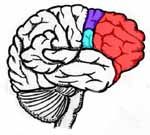
| Function | Observed problems |
|---|---|
| awareness | inability to focus on task |
| attention & concentration | impaired recent memory |
| memory | difficulty learning new information |
| cognition | problem solving difficulty |
| motivation | inability to plan sequence of tasks |
| judgment | changes in social behavior |
| voluntary movement | loss of simple movement |
| expressive language | inability to express language (Broca’s Aphasia) |
| memory for habits & motor activities | loss of flexibility in thinking |
| emotional control & impulse control | mood changes (emotional lability) |
| word associations | persistence of a single thought (perseveration) |
| ability to follow instructions | |
| decision making | |
| personality | changes in personality |
| assigns meanings to words we choose | loss of spontaneity |
Parietal lobes
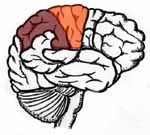
| Function | Observed problems |
|---|---|
| visual attention | inability to focus on visual attention |
| awareness of spatial relationships | |
| touch | inability to name an object Anomia) |
| recognition of faces | difficulty in distinguishing right from left |
| goal-directed voluntary movements | inability to locate the words for writing (Agraphia) |
| manipulation of objects | problems with reading (Alexia) |
| integration of different senses that allows for understanding a single concept | difficulty with drawing objects |
| difficulty in doing mathematics (Dyscalculia) | |
| lack of awareness of certain body parts and/or surrounding space (Apraxia) | |
| inability to attend to more than one object at a time | |
| difficulties with eye and hand coordination |
Occipital lobe
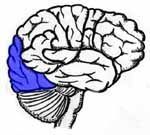
| Function | Observed problems |
|---|---|
| visual perception | defects in vision |
| visual input | difficulty with locating objects in environment |
| difficulty with identifying colors (Color Agnosia) | |
| production of hallucinations | |
| inaccurately seeing objects | |
| reading (perception & recognition of words) | inability to recognize words |
| difficulties with reading and writing | |
| movement of eyes | inability to recognize the movement of an object (Movement Agnosia) |
| difficulty in recognizing drawn objects |
Temporal lobes
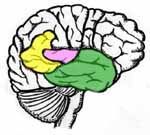
| Function | Observed problems |
|---|---|
| hearing, music, & receptive language | difficulty in understanding spoken words (Wernicke’s Aphasia) |
| comprehension of language | |
| memory acquisition | short-term memory loss |
| memory for non-verbal events | disturbance with selective attention to what we hear & see |
| information retrieval | interference with long term memory |
| some visual perceptions | difficulty with identification of and visualization about objects |
| categorizations of objects | inability to categorize objects |
| expressed behavior | increased aggressive behavior, agitation, irritability & childish behavior |
| increase or decrease in sexual behavior | |
| difficulty in recognizing faces (Prosopagnosia) | |
| right lobe damage can cause persistent talking |
Cerebral cortex
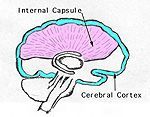
| Function | Observed problems |
|---|---|
| higher cortical functions |
Limbic system
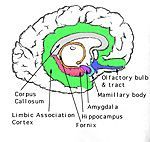
| Function | Observed problems |
|---|---|
| emotions | loss of emotional control |
| learning | loss of recent memory |
| sense of smell | loss of sense of smell |
Diencephalon
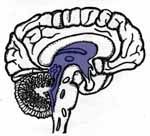
Thalamus
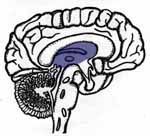
| Function | Observed problems |
|---|---|
| processing center of the cerebral cortex | altered level of consciousness |
| sensory relay–coordinates & regulates all functional activity of the cortex by integrating all nerve inputs (except smell) to the cortex | loss of perception |
| contributes to affectual expression |
Hypothalamus
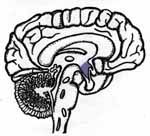
| Function | Observed problems |
|---|---|
| integrates the Autonomic Nervous System (body temperature & endocrine function) | hormonal imbalances |
| parasympathetic function | inability to control temperature |
| sympathetic function (flight or fight) | diabetes insipidus |
| physical expressions of behavior | |
| feeding center | |
| pleasure center |
Internal capsule
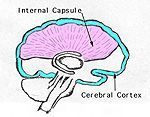
| Function | Observed problems |
|---|---|
| motor tracts | paralysis on the opposite side of the body |
Reticular activating system
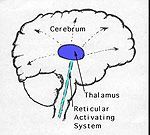
| Function | Observed problems |
|---|---|
| attention, eating, wakefulness, & arousal from sleep | altered level of consciousness |
Brain Stem
| Function | Observed problems |
|---|---|
| breathing | decreased vital capacity in breathing |
| heart rate | swallowing food & water (Dysphagia) |
| swallowing | difficulty with organization & perception of environment |
| reflexes to seeing & hearing (startle reflex) | problems with balance and movement |
| controls sweating, blood pressure, digestion, temperature (Autonomic Nervous System) | dizziness & nausea |
| affects level of alertness | sleeping difficulties (insomnia, sleep apnea) |
| ability to sleep | |
| sense of balance (vestibular function) |
Midbrain
| Function | Observed problems |
|---|---|
| nerve pathways of cerebral hemispheres | |
| auditory & visual reflex centers | |
| oculomotor nerve (III) eye movement | |
| trochlear nerve (IV) controls muscle that rotates eye down & out |
Pons
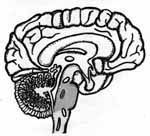
| Function |
|---|
| respiratory center |
| trigemenal nerve (V)–facial skin, tongue, teeth, mastication |
| abducens nerve (VI) controls muscle that rotate eye outward |
| facial nerve (VII) controls muscles of expression |
| acoustic nerve (VIII) hearing & balance |
Medulla oblongata
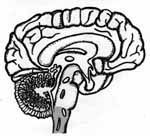
| Function |
|---|
| crossing of motor tracts |
| cardiac center |
| respiratory center |
| vasomotor (nerves that control muscles of walls of blood vessels) |
| cough, gag, swallow, & vomit |
| glossopharyngeal nerve (IX) (pharynx & tongue) |
| vagus (X) pharynx, larynx, heart, lungs & stomach |
| accessory nerve (XI) rotation of head and shoulder |
| hypoglossal (XII) intrinsic muscles of the tongue |
Cerebellum
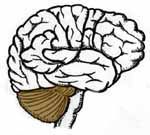
| Function | Observed problems |
|---|---|
| coordination of voluntary movement | loss of ability to coordinate fine movements |
| balance & equilibrium | loss of ability to walk |
| some memory for reflex motor acts | inability to reach out and grab objects |
| tremors | |
| dizziness (vertigo) | |
| slurred speech | |
| inability to make rapid movements | |
| nystagmus |
Right hemisphere
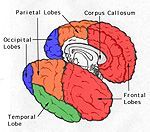
| Function |
|---|
| holistic processing of multi-sensory input |
| visual spatial skills |
| memory stored in auditory, visual, & spatial modes |
| remembering non-verbal material |
| color discrimination |
Left hemisphere
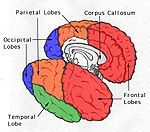
| Function |
|---|
| analytic & sequential thinking |
| language |
| mathematics |
| abstraction & reasoning |
| ability to name objects & their attributes |
| memory stored in language format |
When you need a brain injury attorney, call the Law Office of Stephen L. Gerdes in Omaha, NE, at (402) 393-1435.